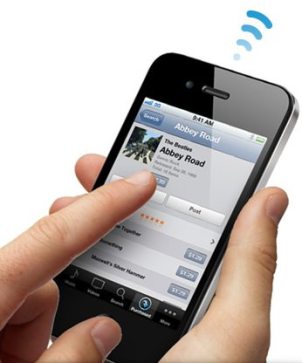
Jobs announced iTunes Match, a $24.99 per year service that will match music you’ve ripped from CDs with iTunes’ library of 18 million songs, ultimately giving you the ability to listen to your music anywhere via iCloud on iOS devices or PCs.
[aditude-amp id="flyingcarpet" targeting='{"env":"staging","page_type":"article","post_id":297307,"post_type":"story","post_chan":"none","tags":null,"ai":false,"category":"none","all_categories":"business,media,mobile,","session":"B"}']Jobs made sure to point out that iTunes Match will sync up your library with iCloud much faster than Google Music or Amazon’s Cloud Player, both of which require you to actually upload files to their servers. Jobs said that iTunes Match could synchronize huge music libraries in minutes, since all it’s doing is checking metadata in music files with songs in iTunes’ library.
Songs that are properly matched with the service will be stored as high-quality 256Kbps AAC audio files on Apple’s servers. But those that aren’t matched will have to be uploaded just like Google and Amazon’s offerings.
AI Weekly
The must-read newsletter for AI and Big Data industry written by Khari Johnson, Kyle Wiggers, and Seth Colaner.
Included with VentureBeat Insider and VentureBeat VIP memberships.
Jobs didn’t mention any licensing deals that are allowing it to legally offer iTunes Match as a service, but it’s likely what the company has been pursuing for months with its record label talks. We reported last week that Apple may have spent between $100 million and $150 million licensing music from the four major labels. Both Amazon and Google launched their services without working out licensing deals, which is likely why they don’t yet have any similarly convenient library matching services.
Apple has also snagged a decent price for iTunes Match. Google Music is currently free while it’s in beta, but that could change in a few months. Amazon charges $20 a year for 20 gigabytes of storage on its Cloud Drive (although you can receive 20GB of storage free by purchasing an MP3 album from Amazon). Since Apple is giving users access to music it already has on its servers, it can also effectively offer consumers an unlimited amount of streaming music via iCloud. (Though we don’t know if uploaded music will factor into a user’s 5GB of free iCloud storage.)
Apple won’t be able to lord this feature over Amazon and Google for long, as both companies are reportedly still pursuing deals with music labels. But even then, both Amazon and Google won’t be able to offer as seamless a digital music ecosystem as iTunes.
VentureBeat's mission is to be a digital town square for technical decision-makers to gain knowledge about transformative enterprise technology and transact. Learn More
